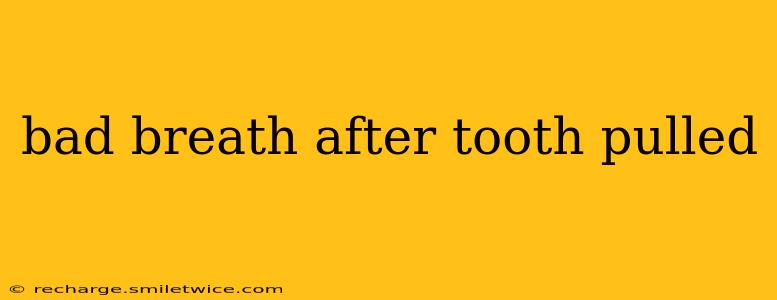Having a tooth pulled is a common procedure, but it can sometimes lead to unpleasant side effects, one of which is bad breath, or halitosis. This isn't uncommon and usually resolves itself, but understanding the causes and how to address it can provide significant relief and peace of mind. This comprehensive guide will delve into the reasons why you might experience bad breath after a tooth extraction and offer effective solutions to freshen your breath and promote oral health.
Why Does My Breath Smell Bad After a Tooth Extraction?
Several factors contribute to bad breath following a tooth extraction. The most common culprits are:
-
Dry Socket: This painful condition occurs when the blood clot that forms in the extraction site dislodges or dissolves prematurely. The exposed bone and nerve endings become susceptible to infection and bacteria, leading to a particularly foul odor. Dry socket is often characterized by a persistent, pungent smell.
-
Infection: Bacterial infection at the extraction site is another frequent cause of bad breath. The presence of bacteria can produce volatile sulfur compounds (VSCs), the primary contributors to bad breath. Signs of infection include swelling, pain, redness, and pus.
-
Food Debris: Even with careful cleaning, small food particles can become trapped in the extraction socket or around the surrounding teeth, leading to bacterial growth and odor.
-
Poor Oral Hygiene: Neglecting proper oral hygiene practices, especially after a tooth extraction, can significantly worsen bad breath. This includes infrequent brushing, flossing, or mouth rinsing.
-
Medications: Some medications can cause dry mouth, which is a known contributor to halitosis. A dry mouth environment allows bacteria to thrive.
How Long Does Bad Breath Last After Tooth Extraction?
The duration of bad breath after a tooth extraction varies depending on the individual and the underlying cause. In most cases, mild bad breath associated with food debris or minor irritation resolves within a few days with good oral hygiene. However, if the bad breath is severe or persistent, especially if accompanied by pain or other symptoms, it could indicate a more serious issue like dry socket or infection, potentially lasting longer and requiring professional intervention.
What Can I Do to Prevent Bad Breath After a Tooth Extraction?
Prevention is key to avoiding bad breath after a tooth extraction. Here's what you can do:
-
Follow Post-Operative Instructions: Adhere meticulously to your dentist's post-operative instructions, including any prescribed medications and cleaning regimens.
-
Maintain Excellent Oral Hygiene: Gently brush and rinse your mouth regularly, but avoid directly disturbing the extraction site. Use a soft-bristled toothbrush.
-
Eat a Healthy Diet: Consume nutritious foods and avoid sticky or hard-to-chew items that could lodge in the extraction site.
-
Stay Hydrated: Drink plenty of water to keep your mouth moist and prevent dry mouth.
How to Treat Bad Breath After a Tooth Extraction?
Treatment for bad breath after a tooth extraction depends on the underlying cause:
-
For Mild Bad Breath: Good oral hygiene, rinsing with saltwater, and maintaining hydration are usually sufficient.
-
For Dry Socket: Your dentist can treat dry socket by cleaning the socket and packing it with medicated dressings to promote healing and alleviate the odor.
-
For Infection: Antibiotics may be necessary to combat the infection and eliminate the bad breath.
-
For Persistent Bad Breath: Consult your dentist or oral surgeon to determine the cause and receive appropriate treatment.
Is Bad Breath After a Tooth Extraction Normal?
Mild bad breath immediately following a tooth extraction is relatively common and often temporary. However, persistent, severe, or foul-smelling breath could indicate a complication requiring professional attention. If you experience any concerns, contact your dentist or oral surgeon promptly.
When Should I Call My Dentist About Bad Breath After a Tooth Extraction?
Contact your dentist or oral surgeon immediately if you experience:
- Severe or persistent bad breath
- Intense pain
- Swelling or redness at the extraction site
- Fever or chills
- Pus or discharge from the extraction site
This information is intended for general knowledge and informational purposes only, and does not constitute medical advice. It is essential to consult with a qualified healthcare professional for any health concerns or before making any decisions related to your health or treatment.
